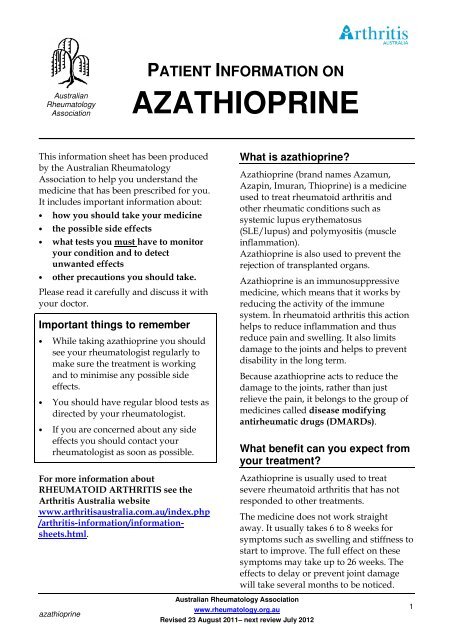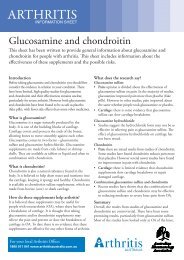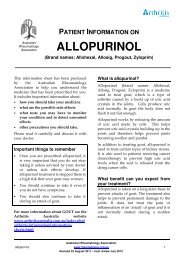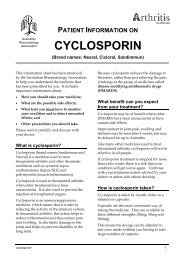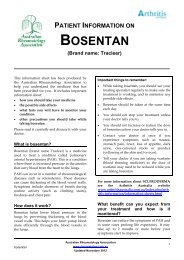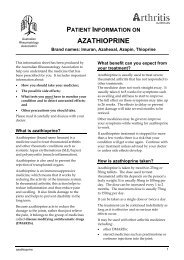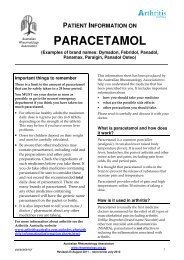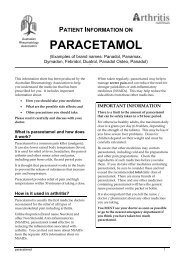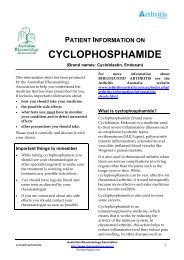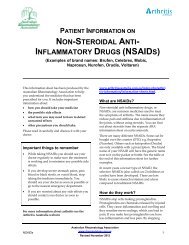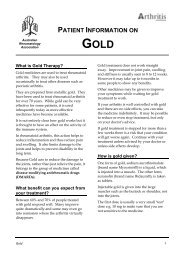AZATHIOPRINE - Australian Rheumatology Association
AZATHIOPRINE - Australian Rheumatology Association
AZATHIOPRINE - Australian Rheumatology Association
- No tags were found...
You also want an ePaper? Increase the reach of your titles
YUMPU automatically turns print PDFs into web optimized ePapers that Google loves.
PATIENT INFORMATION ON<strong>Australian</strong><strong>Rheumatology</strong><strong>Association</strong><strong>AZATHIOPRINE</strong>(Brand names: Azamun, Azapin, Imuran, Thioprine)This information sheet has been producedby the <strong>Australian</strong> <strong>Rheumatology</strong><strong>Association</strong> to help you understand themedicine that has been prescribed for you.It includes important information about:• how you should take your medicine• the possible side effects• what tests you must have to monitoryour condition and to detectunwanted effects• other precautions you should take.Please read it carefully and discuss it withyour doctor.Important things to remember• While taking azathioprine you shouldsee your rheumatologist regularly tomake sure the treatment is workingand to minimise any possible sideeffects.• You should have regular blood tests asdirected by your rheumatologist.• If you are concerned about any sideeffects you should contact yourrheumatologist as soon as possible.For more information aboutRHEUMATOID ARTHRITIS see theArthritis Australia websitewww.arthritisaustralia.com.au/index.php/arthritis-information/informationsheets.html.What is azathioprine?Azathioprine (brand names Azamun,Azapin, Imuran, Thioprine) is a medicineused to treat rheumatoid arthritis andother rheumatic conditions such assystemic lupus erythematosus(SLE/lupus) and polymyositis (muscleinflammation).Azathioprine is also used to prevent therejection of transplanted organs.Azathioprine is an immunosuppressivemedicine, which means that it works byreducing the activity of the immunesystem. In rheumatoid arthritis this actionhelps to reduce inflammation and thusreduce pain and swelling. It also limitsdamage to the joints and helps to preventdisability in the long term.Because azathioprine acts to reduce thedamage to the joints, rather than justrelieve the pain, it belongs to the group ofmedicines called disease modifyingantirheumatic drugs (DMARDs).What benefit can you expect fromyour treatment?Azathioprine is usually used to treatsevere rheumatoid arthritis that has notresponded to other treatments.The medicine does not work straightaway. It usually takes 6 to 8 weeks forsymptoms such as swelling and stiffness tostart to improve. The full effect on thesesymptoms may take up to 26 weeks. Theeffects to delay or prevent joint damagewill take several months to be noticed.azathioprine<strong>Australian</strong> <strong>Rheumatology</strong> <strong>Association</strong>www.rheumatology.org.auRevised 23 August 2011– next review July 20121
Other medicines may be given to improveyour symptoms while waiting forazathioprine to work.If you stop your azathioprine treatment formore than a few weeks there is a risk thatyour condition may worsen.Treatment with azathioprine may becontinued indefinitely as long as it iseffective and no serious side effects occur.How is azathioprine taken?Azathioprine is taken by mouth in 25mgor 50mg tablets. The dose used to treatrheumatoid arthritis depends on theperson’s body weight. It is usually startedat 50mg to 100mg per day. The dose can beincreased every 1 to 2 months. Themaximum dose can be up to 250mg perday.It can be taken as a single dose or twice aday.It may be used with other arthritismedicines including:• other DMARDs• steroid medicines such as prednisoloneor cortisone injections into the joint• anti-inflammatory medicines (NSAIDs)such as naproxen (Naprosyn) oribuprofen (Brufen, Nurofen)• simple pain medicines such asparacetamol.Are there any side effects?You might experience with yourtreatment. Tell your doctor if you areconcerned about possible side effects.A reduction in dose may minimise the sideeffects so that you can continue to take thistreatment. Your doctor will advise on anydose changes that are necessary.Most common possible side effects• 10-15% of people taking azathioprineexperience stomach or bowel sideeffects, which might include nausea(feeling sick), vomiting, abdominal pain ordiarrhoea. Taking azathioprine twice aday instead of all at once, or taking itafter eating, may help avoid theseproblems. Antinausea tablets can beused if needed.• About 5% of people have side effectssuch as skin rashes and increasedsensitivity to the sun. It is a good idea touse sunscreen and to wear a hat whenout in the sun.Less common or rare possible side effects• Effects on the liver and pancreas:azathioprine can cause liver testabnormalities or hepatitis(inflammation of the liver). This occursin less than 1% of people taking themedicine. This does not causesymptoms unless severe so regularblood tests are important.If you develop symptoms such asyellow discolouration of the whites ofyour eyes or yellow skin tell yourdoctor straight away. Azathioprine canalso cause pancreatitis (inflammationof the pancreas), which can result inabdominal pain.• Blood counts: azathioprine can cause adrop in the number of white bloodcells, which are needed to fightinfection. It can also cause a drop in thenumber of platelets, which help to stopbleeding.Regular blood tests aim to pick theseproblems up early when they occur.However, if you develop a sore mouth,mouth ulcers, easy bruising,nosebleeds, bleeding gums,breathlessness, infection or fever tellyour doctor straight away.• Hypersensitivity: A small number ofpeople have a hypersensitivity reactionone to two weeks after startingazathioprine. This causes sudden onsetmuscle aches and pains and fever. Ifazathioprine<strong>Australian</strong> <strong>Rheumatology</strong> <strong>Association</strong>www.rheumatology.org.auRevised 23 August 2011– next review July 20122
you develop any of these symptomstell your doctor straight away.• Infections: There is an increased risk ofdeveloping some infections, especiallyherpes zoster (chicken pox andshingles). You should try to avoidcontact with people who have theseinfections. If you have an infection orpersistent fever, tell your doctorstraight away.• Cancer: Studies of transplant patientstaking azathioprine have found it mayincrease risk of skin cancers. There maybe a similar risk in people withrheumatic conditions who takeazathioprine for long periods of time.You should discuss this issue withyour rheumatologist before starting themedicine (see Precautions on page 4).What precautions are necessary?Blood tests• Before starting azathioprine, you maybe asked to have a blood test to look atan enzyme (TPMT). This will checkwhether your bone marrow cells aremore sensitive to the medicine. Theresult will decide whether thistreatment is suitable for you andwhether you should use a lower dose.• Since the liver and blood cells may beaffected by azathioprine, you musthave regular blood tests during yourtreatment. This is very important asyou may not get symptoms of theseproblems.• Blood tests are particularly importantduring the first few months oftreatment.• As well as monitoring for side effects,blood tests help to monitor yourcondition to determine if the treatmentis effective.• You will need to have full blood countsand liver function tests every 2 to 4weeks for the first few months oftreatment and then every 1 to 3 monthsafter that.• If there are no abnormalities seen after3 months of treatment at a specific doseof azathioprine, the blood tests may bedone less frequently.• Your general practitioner will beinformed about the monitoringschedule. It is important to see yourgeneral practitioner if you have beenasked to do so as they have animportant role to play in monitoringyour condition.Use with other medicines• Azathioprine can interact with othermedicines. You should tell your doctor(including your general practitioner,rheumatologist and others) about allmedicines you are taking or plan totake. This includes over the counter orherbal/naturopathic medicines.• Allopurinol (Allohexal, Allosig,Progout, Zyloprim), used in thetreatment of gout, will increase thelevel of azathioprine in the blood.Taking allopurinol with azathioprinecan therefore be very dangerous. Youmust tell your doctor if you are takingor are advised to take allopurinol. Ifazathioprine is taken with allopurinolits dose needs to be very carefullyreviewed.• Combined pain medicines such asPanadeine and Panadeine Forte can beused safely with azathioprine providedyou take them as directed.• Azathioprine can also be used safelywith anti-inflammatory drugs(NSAIDs) as long as your kidneyfunction is normal.• If you are on azathioprine it isrecommended you should not beimmunized with ‘live’ vaccines such asMMR (measles, mumps and rubella),OPV (oral polio vaccine), BCG (BacillusCalmette Guerin) or yellow fever. Talkazathioprine<strong>Australian</strong> <strong>Rheumatology</strong> <strong>Association</strong>www.rheumatology.org.auRevised 23 August 2011– next review July 20123
to your doctor before receiving anyvaccines.Use with alcohol• Because azathioprine can affect yourliver, you should avoid heavy alcoholuse while taking it.• It is not known precisely what level ofdrinking is safe when on azathioprine.However, there is general agreementthat 1 to 2 standard drinks taken onceor twice a week is unlikely to cause aproblem.• Drinking more than 4 standard drinkson one occasion, even if infrequently, isstrongly discouraged.Use in pregnancy and breastfeeding• Azathioprine has been used safely inpregnancy and breastfeeding.• Should you wish to become pregnantor you intend to breastfeed, you shoulddiscuss this with your doctor.Skin cancer prevention• When taking azathioprine, it isimportant to use sunscreen and avoidprolonged sun exposure. A yearly skincheck is recommended.How to store azathioprine• Store azathioprine in a cool, dry place,away from direct heat and light. (e.g. notin the bathroom).• Keep all medicines out of reach ofchildren.Questions?If you have any questions or concerns writethem down and discuss them with yourdoctor.Your doctor’s contact detailsIf you are taking azathioprine you shouldsee your rheumatologist regularly to makesure the treatment is working and tominimise any possible side effects.The information in this sheet has been obtained from various sources and has been reviewed by the <strong>Australian</strong> <strong>Rheumatology</strong> <strong>Association</strong>. It is intended as aneducational aid and does not cover all possible uses, actions, precautions, side effects, or interactions of the medicines mentioned. This information is not intendedas medical advice for individual problems nor for making an individual assessment of the risks and benefits of taking a particular medicine. It can be reproduced in itsentirety but cannot be altered without permission from the ARA.The NHMRC publication: How to present the evidence for consumers: preparation of consumer publications (2000) was used as a guide in developing thispublication.azathioprine<strong>Australian</strong> <strong>Rheumatology</strong> <strong>Association</strong>www.rheumatology.org.auRevised 23 August 2011– next review July 20124


